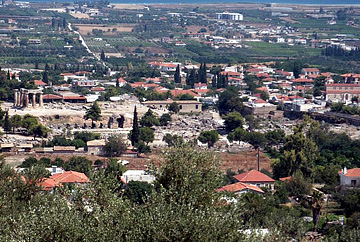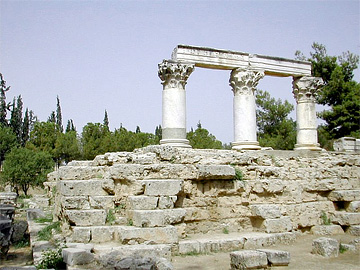If you consider the issue of Christians in conflict from a New Testament perspective, you will quickly focus on Corinth. No church in Scripture is more ridden with disagreement and controversy than the Corinthian church, which explains, in part why so much of the New Testament focuses on Corinth. It took the Apostle Paul multiple visits and letters, two of which we have in the New Testament, to sort out the problems in this church. (Photo: Ancient Corinth today. Photo used by permission of holylandphotos.org.)
 The letter we know as 1 Corinthians (which is actually Paul’s second letter, see 1 Cor 5:9) was written primarily because the Christians in Corinth weren’t getting alone with each other. After greeting the letter recipients at the beginning of the first chapter, Paul explains what he has learned about this church:
The letter we know as 1 Corinthians (which is actually Paul’s second letter, see 1 Cor 5:9) was written primarily because the Christians in Corinth weren’t getting alone with each other. After greeting the letter recipients at the beginning of the first chapter, Paul explains what he has learned about this church:
For it has been reported to me by Chloe’s people that there are quarrels among you, my brothers and sisters. What I mean is that each of you says, “I belong to Paul, “or “I belong to Apollos,” or “I belong to Cephas, ” or “I belong to Christ.” (1:11-12)
The Greek word translated here as “quarrel” can also mean “argument” or “strife.” Paul uses this same word again in the third chapter of his letter: “For as long as there is jealous and quarreling [eris] among you, are you not of the flesh . . . ?” (3:3). The Corinthian church is being torn apart, not by one single controversy, but by multiple conflicts and tensions.
As we read through 1 Corinthians we can compile as list of these divisive issues. They include:
• Over-identification with one or another Christian leader.
• Too much pride in one’s own spirituality.
• Sexual immorality.
• Suing fellow Christians in court.
• Prostitution.
• Marriage and divorce.
• Participating in the worship of idols.
• Dressing immodestly in the church gatherings.
• Selfishness in church gatherings.
• Interrupting the gatherings with ecstatic utterances.
Beneath this plethora of issues lay the challenge of working out the Christian life in a non-Christian culture. When some of the people in Corinth put their faith in Jesus, naturally enough they brought along their cultural baggage, including prior experiences in paganism. For example, since it was commonplace for wealthier members of Corinthian society to eat in pagan temples, the privileged few in the Christian community continued to do what came naturally. Yet this scandalized other Christians, especially those who did not have the financial means to eat in temples and who, therefore, considered all temple visitation to be the worship of idols.
In my next post, and in several to follow, I will summarize Paul’s response to the conflicts in Corinth. As promised, I will draw practical conclusions as well as make some historical and theological observations.
For now, however, I simply want to note once again that conflict is a normal part of Christian experience. I’m not happy about this, of course. And Scripture makes it clear that God isn’t happy about this either. But conflict is a fact Christian fellowship. As I’ve said before, I once thought: “Oh, if I could only be back in time of the apostles it would be great. Then the church wouldn’t be in such as mess as it is today.” Yet, if you go back and read the New Testament carefully, especially the letters of Paul or the letters in Revelation 2-3 to the seven churches in Asia Minor, you realize that the church has experienced conflict from the get go. This fact encourages us not to be surprised when we face conflict today. We should be ready to see it in God’s terms and to follow God’s guidance for how to resolve it.

